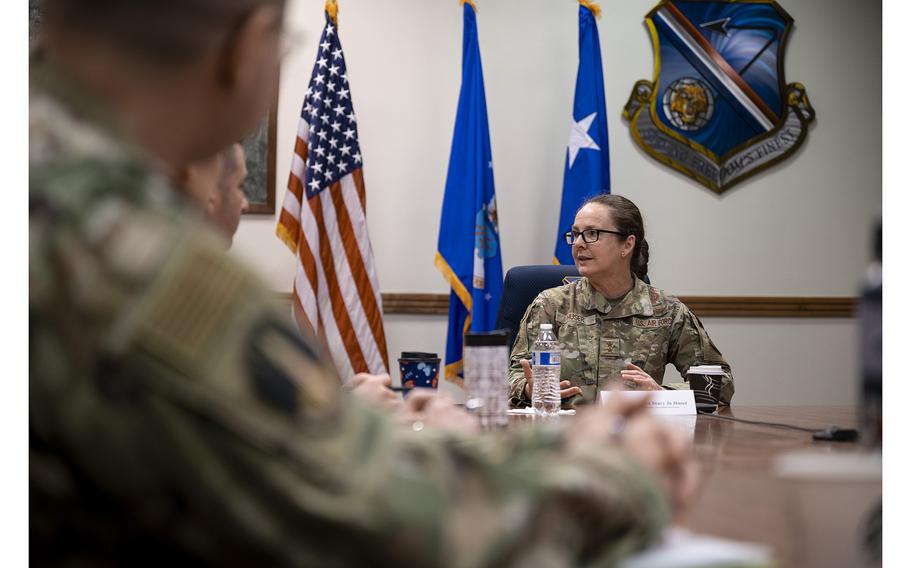
Maj. Gen. Stacy Huser, 20th Air Force commander, hosts an all-call with Kirtland nuclear and missile operations officers, missile and space systems maintenance specialists, and munitions and missile maintenance airmen at Kirtland Air Force Base, N.M., on Feb. 9, 2024. (Karissa Dick/U.S. Air Force)
CHEYENNE, Wyo. (Tribune News Service) — The United States military is undergoing a “momentous undertaking” of nuclear weapon modernization, said Maj. Gen. Stacy Jo Huser, who oversees the development of such technology.
The 20th Air Force is headquartered at F.E. Warren Air Force Base and is responsible for the nation’s three intercontinental ballistic missile (ICBM) wings, one nuclear operations support wing and one geographically separated unit (GSU).
The major general was invited to speak at the Greater Cheyenne Chamber of Commerce’s Military Affairs Committee Luncheon on Friday, where she briefly spoke about the role of F.E. Warren Air Force Base in updating its nuclear technology.
“The current international environment presents continued risks that demonstrate, now more than ever, the need for a strong U.S. nuclear deterrent,” Huser said at the luncheon. “And we’ve been tasked by the nation to modernize our nuclear delivery platforms.”
These modernized platforms include B-21 Raiders, Columbia-class submarines and the Sentinel ICBM project, which is overseen by the 20th Air Force. Huser added that all of this is being done in coordination with the modernization of types of nuclear warheads.
From 2019 to 2022, Huser traveled around the country and worked as a “glorified liaison” between the U.S. Department of Energy and the Department of Defense. The Department of Energy designs and constructs the nuclear weapons before they are sent over to the Department of Defense for review.
“All of our nuclear deterrence work is in the hands of not only our amazing military members, our amazing leaders, but it’s also in the hands of incredible civilians and technical experts that are all over our country,” Huser said. “Since the days of the Manhattan Project, the highly talented people of the nuclear security enterprise have responded to an ever-evolving global security environment.”
Huser worked as the middleman in these conversations between the departments regarding the construction of nuclear technology. In December, she was promoted to commander of the 20th Air Force, the highest-ranking position that oversees the nation’s ground-based nuclear missiles, and is the first woman to do so.
In January, the U.S. Air Force notified Congress the new Sentinel ICBMs would cost 37% more than expected and would take an additional two years to build and deploy, according to reporting from the Arms Control Association.
The Nunn-McCurdy Act requires the Department of Defense to notify Congress when a Major Defense Acquisitions Program (MDAP) or major subprogram experiences a cost exceeding its threshold. These cost overruns, otherwise known as a Nunn-McCurdy breach, are labeled as either “significant” or “critical.”
The Sentinel ICBM project is in “critical” breach of the act, according to the ACA. A military spokesperson told the Wyoming Tribune Eagle that Congress is expected to make a decision by July on whether to move forward with the project.
Leadership across the DOD has determined there’s no alternative, Huser said, and there’s a lot of confidence the program will move forward.
The modernization of nuclear technology is dependent on the work of hundreds of thousands of people around the country, Huser added, especially in places such as Savannah, Georgia; Kansas City, Missouri; Los Alamos, New Mexico; Great Falls, Montana; and Cheyenne, among several others.
“This is one of the most monumental undertakings our nation has ever done, and this is going to be the future of our ICBMs and the future of our security,” Huser said. “It’s going to provide a powerful and lasting impact not only in the military and our deterrent, but also in our community and in the surrounding communities.”
(c)2024 Wyoming Tribune-Eagle (Cheyenne, Wyo.)
Visit Wyoming Tribune-Eagle
Distributed by Tribune Content Agency, LLC.